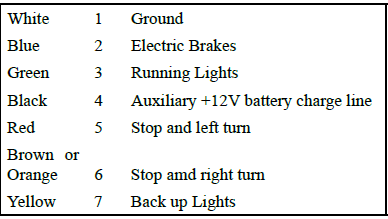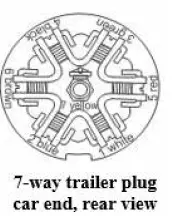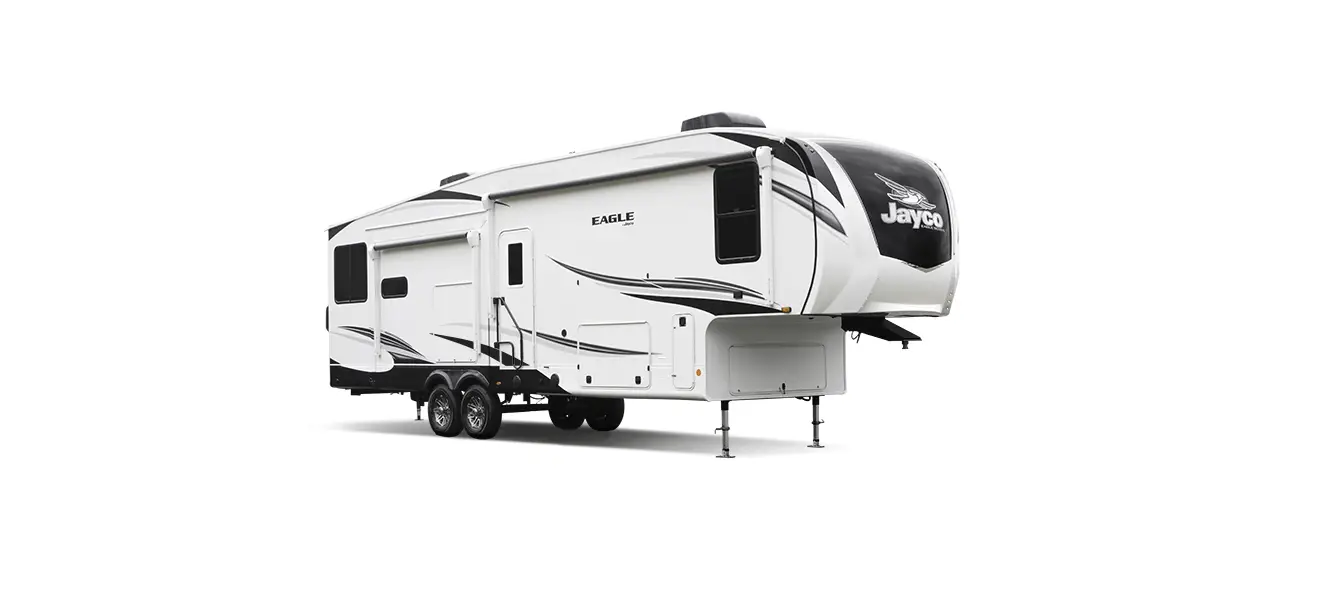Jayco Eagle Fifth Wheels 2023 Wire Harness/Connector Plug
In the world of recreational vehicles, the 2023 Jayco Eagle Fifth Wheels stand out as a model of innovation and usability, combining modern comforts with useful design in a way that is seamless. The wire harness/connector plug is the most important part of these great fifth wheels because it makes them both useful and safe. As a way to connect electrically, the wire harness/connector plug is the key that holds the Jayco Eagle Fifth Wheels to their towing counterparts. This makes it possible for a number of tasks to happen at the same time. From the brake lights to the turn signals, the wire harness/connector plug makes sure that these important features work well together. As we learn more about this important part, we’ll see that the wire harness/connector plug’s reliability is based on careful work and industry standards. In the ever-changing world of RV travel, the wire harness/connector plug on the 2023 Jayco Eagle Fifth Wheels shows how cutting-edge tech and the desire for a unique trip can come together.
Wire Harness/Connector Plug
A 7-way wire harness/connector plug is wired into your trailer to connect electrical power from the tow vehicle for travel. This supplies power to the RV brakes, taillights, clearance lights, turn signals, brake lights, etc. Wiring to operate your brakes must be the same size in both the tow vehicle and RV (the RV brake wiring is a 12-gauge wire). When attaching wires to your tow vehicle, tape all the connections for moisture protection.
The connector plug may build up corrosion with extended use. It should be cleaned periodically to insure good electrical contact. Make sure the connector plug is kept clean and protected from road elements as you travel.
NOTE:
A 12V circuit tester is recommended to verify the trailer connections.

Weighing Your Tow Vehicle and RV
When the RV is fully loaded it should be weighed. The actual weight of the vehicle, all options, liquids, the hitch weight, and your personal cargo is important for you to know so you do not exceed the GVWR. Two important factors when loading your RV are total weight and balance. It is imperative that you verify compliance within all applicable weight ratings. Overloading your RV will void the Towable Limited Warranty and the warranties of many component part manufacturers. Periodically weigh your RV at a public scale to determine proper load distribution. To obtain the side-to-side weights, there needs to be enough space on either side of the scale to accommodate the RV being partially off the scale. Keep in mind that individual scales will operate differently.
To weigh your tow vehicle and RV
Warning
- The total weight of your tow vehicle and RV must not exceed the GCWR. Do not assume that you can tow an RV that happens to be within the capacity of the tow vehicle hitch. By doing so, you may exceed the total GCWR of your tow vehicle and RV towing combination.
- It is important to redistribute the load to avoid component failure as well as to improve the handling characteristics of the vehicle and not void the Towable Limited Warranty.
Your RV must be weighed fully loaded (with food, clothing, fuel, water, propane, supplies, etc.).
- Weigh the RV including the tongue weight, while detached from the tow vehicle. This actual overall weight must be less than or equal to the GVWR for safe operation. If the overall weight is greater than the GVWR, some contents must be removed until the actual overall weight is less than or equal to GVWR.
- Hitch the RV to your tow vehicle. Weigh the RV and the tow vehicle to determine the GCW. Make sure that this rating is less than or equal to the GCWR as specified by the manufacturer of your tow vehicle. If this overall weight is greater than the GCWR, some contents must be removed to bring the combination into compliance with the listed ratings.
- Weigh the RV while attached to but excluding the tow vehicle. This will result in the actual weight that is exerted on all of the RV tires. This weight may be subtracted from the overall RV GVWR to determine the actual “tongue” weight.
- With the RV still attached to the tow vehicle, weigh each wheel position separately to ensure each tire is not overloaded.
To determine the wheel position weight - Pull the RV onto the scale so only one tire is on the scale. Record the weight. Your RV must remain as level as possible on the scale (even though an axle or side is not physically on the scale).
- To calculate the opposite side of the RV wheel position weight, subtract the first side’s weight from the weight determined in step #3.
If there is a difference in the weights on one side of the vehicle as compared to weights on the other side, components (tires, wheels, brakes, springs, etc.) on the heavier side could be overloaded, even though the total axle load is within the GAWR. Once actual weights are obtained, compare them to the Weight Information Label weight ratings to ensure you are below the posted minimum ratings. See the Weight Terms and Loading Your RV sections for important weight information.
FAQ
The wire harness/connector plug in an RV like the Jayco Eagle Fifth Wheels serves as the electrical connection point between the tow vehicle and the trailer. It allows for communication between the two vehicles’ electrical systems.
RV connector plugs usually have either 7 pins or 4 pins, depending on the type of connection needed for towing functions.
The wire harness/connector plug supports various functions, including brake lights, turn signals, running lights, reverse lights, electric brakes (if applicable), and sometimes power for accessories within the trailer.
Yes, there are industry standards for wire harness/connector plugs on RVs, ensuring compatibility between different brands of tow vehicles and trailers.
Yes, many RVs allow for charging the trailer’s battery from the tow vehicle’s electrical system through the wire harness/connector plug.
Make sure the connections are secure, and the pins are properly aligned to ensure all functions work correctly. Also, follow the color-coding on the wires for proper connections.
Yes, adapters are available to connect different types of plugs, but be sure to match the pin configuration correctly.
Keep the connections clean and free of corrosion. Use dielectric grease on the connections to prevent corrosion.
It’s possible to add accessories like additional lights or charging ports, but make sure your electrical system can handle the extra load.
A 7-pin plug supports more functions, including electric brakes and 12V charging, while a 4-pin plug typically supports basic lighting functions only.
Check for loose or damaged connections, blown fuses, or faulty wiring. Also, ensure the tow vehicle’s electrical system is functioning properly.
If you’re familiar with wiring and electrical systems, you can replace it yourself. Otherwise, it’s recommended to have a professional handle it.
Yes, waterproof or weatherproof versions are available to protect the connections from moisture and environmental elements.
You can refer to the owner’s manual for your Jayco Eagle Fifth Wheels or contact Jayco’s customer support for accurate and detailed information about the wire harness/connector plug for the 2023 models.
Useful Link
View Full User Guide: Jayco Eagle Fifth Wheels 2023 User Manual
Jayco Eagle Fifth Wheels 2023 Command Center User Manual


